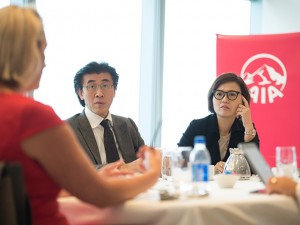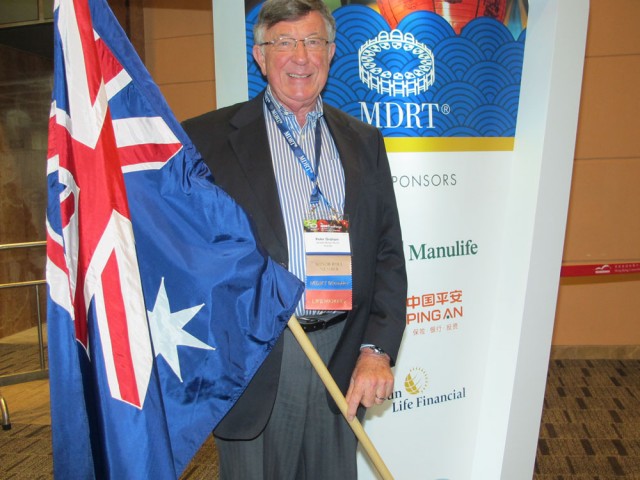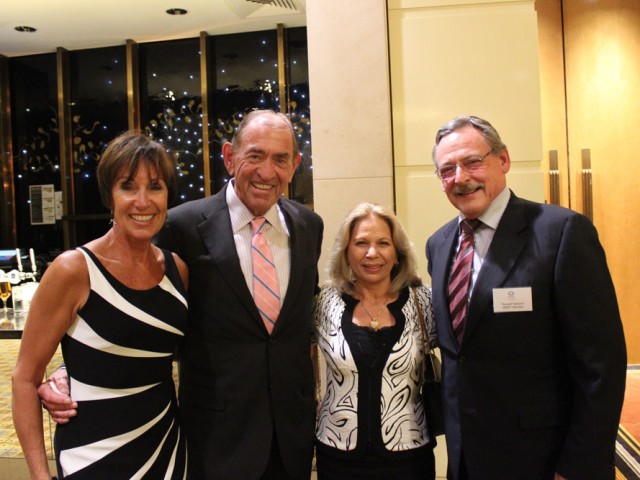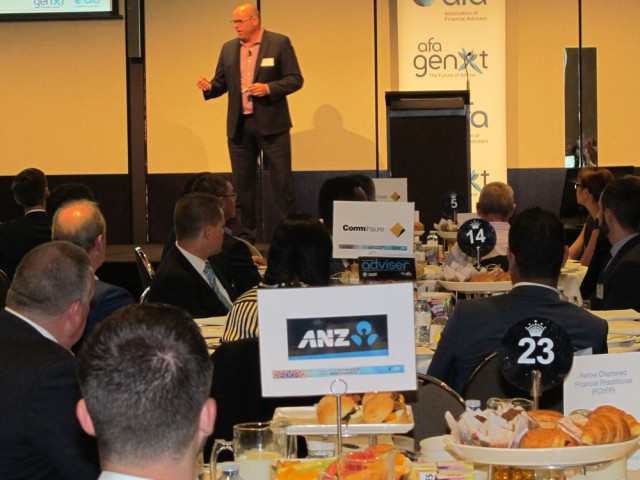The AIA/MDRT Experience Round Table in Hong Kong at the end of January strongly reinforced what appears to be a global trend of positioning the needs and wellbeing of the client at the centre of all life insurance advice conversations.
We learned that historical events, changing compliance standards, emerging technology and the growth of consumerism have all contributed to shaping a universal life insurance advice environment that transcends borders and individual jurisdictions.
Round Table panelists included experienced advisers and stakeholders from both Australia and Hong Kong, who exchanged their thoughts and shared their experiences in considering issues including:
- The nature of life insurance advice
- The evolving role of the risk-focused agent/adviser
- Compliance and regulation requirements, both current and future
- Adviser/agent education and training

Panelists (L to R)
- Elise Sanders – AIA Australia SA State Manager
- Michael Grammatico – MDRT member, Director, Innovative Financial Solutions
- Susan Paterson – MDRT Australia Immediate Past Chair, CEO Business Insurance Group
- Joe Cheng – CEO, Group Agency Distribution, AIA
- Red Wong – AIA Hong Kong District Director
- Peter Sobels – Publisher, Riskinfo
- Inset – Vicki Writer – Founder, 360◦Solution (main platform presenter at 2016 MDRT Experience)
Innovation
AIA Australia SA State Manager, Elise Sanders, spoke of the challenges often associated with being ‘first to market’ with new consumer initiatives: “It’s really important to have innovation. But innovation means leading edge and sometimes you really don’t know whether the initiative will work until you’ve launched it into the market.”
Hong Kong-based Joe Cheng, AIA Global’s CEO Group Agency Distribution, observed that the product development process is different today’s consumer focused world. Using the Hong Kong market as an example, he noted that when it came to innovation there was a ‘product centric’ kind of process that existed until 10 – 15 years ago. “But now there is a more customer centric approach,” said Joe. “We have a process that involves getting feedback from the agency front line, from the customer, from our agency research, which includes research on different consumer ages, life stages and life styles, and also by making reference to competitor products.
Joe continued that innovative products can also be driven by external environments such as interest rate levels. While the process of innovation is driven by multiple factors, each proposed initiative has gone through a consultation process, through research and development, through customer focus groups and by also benchmarking industry competitors.
“It’s a safer way. It doesn’t guarantee success but minimises the risk, said Cheng, “…and gets you closer to what you were expecting.”
The structure and regulatory environment for life agents in Asia
In a region where the regulatory environment is very different to that which exists in Australia, Cheng outlined the products and training available to agents retained in Asia by AIA Global, who “…have a full range of products available for them to use to service their clients’ needs.” He also noted that for some products, agents must go through internal competency testing before they are allowed to have access. “If they don’t pass the test they are not allowed to sell that product.”
He told the panel there exists an internal company competency test, for different types of products. “The adviser must have special knowledge – must acquire special knowledge, before they can use that product,” said Cheng.
In outlining details of the (self-regulated) internal education and training provided to AIA agents in Asia, Cheng emphasised this was only possible once the individual has been able to sit and pass a licensing exam set by the government regulators in almost all Asian countries. “You have to pass that test before you can become licensed to sell – testing which includes the principles of life insurance, compliance etc.”
In stark contrast to what is now the case in the Australian market, Cheng said all new AIA agents received extensive company training, which he says “…adds another layer over the licensing exam standard, in which it double emphasises on the compliance issues contained in the licensing exams.” In addition to this added layer of training, Cheng said a growing number of Asian countries also require their agents to undertake regular CPD points activity requirements. For those countries which are yet to make CPD points compulsory, Cheng says AIA requires an equivalent level of learning activity from its agents in those countries in order to ensure a minimum standard of sometimes self-regulated compliance applies to all AIA agents in Asia.

What is the role of a risk-focused adviser, both today and tomorrow?
Considering the role of risk-focused advisers, Queensland adviser and Australian MDRT Immediate Past Chair, Susan Paterson, said that delivering professional advice today, just like the legal and accounting professions, is very much a specialist field. “…so you’re probably going to find that the [life insurance] advice you get is better coming from a risk specialist than a generalist financial planner.” Susan continued, “Simply, if you’re not working at a job all the time, you’re just not going to be as good at that job as someone who is. For that reason I think there is very much a role for the risk specialist adviser, both today and into the future, which is very focused on that part of the advice market.”
Paterson gave an example from Canada, where she said some advisers specialise only in providing trauma insurance advice solutions. “That’s more difficult to achieve in Australia because of how we’re currently structured, she said, but used this as an example of where, if the regulatory environment was favourable, niche specialisation was possible. “But I think the other thing that is brought to the table by the specialist is the value they add at time of claim,” she said. “Risk specialists have a much greater appreciation of product definitions and the general entitlements of the client when it comes to applying for a claim – the time when a client needs the adviser the most.”
the role of the risk specialist adviser is going to change over time
360◦ Solution Founder, Vicki Writer, who presented on the main platform at the MDRT Experience later on the day the Round Table was conducted, agreed with Paterson about specialisation. She said the way she sees a risk adviser at the moment is as a specialist – an adviser who provides risk mediation strategies, and she also agreed about the value they add at claim time. “But in addition to all of that, I think the role of the risk specialist adviser is going to change over time,” said Writer. She says she believes risk focused advisers should consider a more holistic service offering – not around providing investment advice, “…but there’s a whole other conversation that could potentially be added on to that risk advice component, which is around health and lifestyle,” she said. “There’s a whole range of other areas that the risk-focused adviser will need to be across in future – not necessarily as a specialist but as a facilitator of those additional value-added services, and have referral partners in place, to whom the client can be directed to have those needs gaps serviced.”

Sanders also agreed with her fellow panelists: “You don’t want to generalise what a risk adviser looks like, because you have some advice practices which have multiple risk advisers and administrators who deliver a different solution to that of a sole trader or a single partnership practice. I agree with Vicki about where we’re going with our industry. Risk specialist advisers can still maintain what they’re doing today but strategies around a client’s ‘lifestyle’ will become more important, where the adviser isn’t just talking about the ‘insurance piece’ but also has a strategy that delivers additional value, particularly if the adviser is unable to place the insurance component of the advice service.”
Experienced Queensland adviser and practice co-owner, Michael Grammatico, told the panelists his business (Innovative Financial Solutions) is a full service advice practice. “I do come from a risk advice background but love what Vicki has said about providing a more whole person advice service. We’re very much a ‘goals-based’ financial planning practice,” said Michael, noting the way that financial advice has evolved over time. “Historically we’ve been a sales-based industry, but we’ve moved from being product-centric to client-centric. We are now very much a service-based industry, according to Michael.
Indicative for Michael of how the risk advice sector has matured, he told the panel his business doesn’t just consider the protection or investment needs of a client but rather they address their complete circumstances, including lifestyle needs, goals and objectives. “So we’re addressing not just their life insurance needs but their life stage and lifestyle needs as well.”
When questioned, Grammatico strongly agreed that his business, within an industry that has already moved from a product-based perspective to a client based perspective, will continue to move in line with the future articulated by Vicki Writer, in terms of serving the broader life and lifestyle wants needs of the client. He pointed to the AIA Vitality program and the MLC Best Doctors initiative as examples of this enhanced service proposition.
Grammatico told the panel he believes these programs are extremely beneficial to the consumer, but felt the consumer doesn’t know enough about them. He suggested the product manufacturers conduct more direct marketing to the public “…so that way the consumers are then coming to us and requesting these services,” he said.
Red Wong has been a Hong Kong-based AIA agent for 26 years and is now a District Agency Director with the company. She commenced with AIA direct from college into an internship program, telling her peers that she has experienced one career with a single company (not unusual in South East Asia, but extremely unusual in Australia, and almost impossible within the Australian financial services sector).
Red was asked about what the notion of being a life insurance agent means to her, and whether she believes her role will change or evolve in the future.
People are beginning to think about their long term protection and savings whereas they previously did not
“I have witnessed my own transition from being a life insurance agent to being a financial planner nowadays,” said Red. She was part of the first intake of advisers who undertook the CFP program in Hong Kong (a program from Australia), around 1999/2000. She said a financial planner ‘depression’ in Hong Kong in 1996 was the catalyst for AIA to resolve it would become a one-stop service for all clients, rather than focus only on life insurance services.
“So we now have a financial planner division where the educational background for new advisers requires a Bachelor degree or above. And existing advisers are assigned to special training programs where we learn how to provide a one-stop service to consumers – to our clients.”

Red outlined how the Asian financial ‘tsunami’ in 1997 changed the Hong Kong and Asian advice environment. She said the 1997 crash “…actually helped us to refine our services and take new directions. Then at the end of 2000, mandatory pension fund schemes were introduced. The challenge we faced was how to transform from an insurance agency to an all-round financial services provider.”
Red challenges all new AIA agents about whether they view themselves as life insurance agents or financial planners. “This is the question we face,” said Red, who spoke with great pride and confidence about what she sees as AIA’s full range of services that it can offer today’s consumers, designed to cater to both life insurance as well as broad-based financial planning needs and wealth management solutions.
Red rates Hong Kong as a reasonably mature market in which the penetration of life insurance and financial advice is fairly high. “One consumer may have access to a dozen planners,” said Red, “…so we must distinguish ourselves – we must demonstrate how we provide value.”
She confirmed there were about 32,000 financial planners operating in the Hong Kong market, serving a population of just over 7 million.
In an amazing sign of changing consumer behaviours in the Hong Kong market, Red related that when she first started making prospecting calls she secured on average one appointment out of one hundred calls. But today for new advisers, their success rate is around one appointment from seven or eight calls.
Red says it is the environment that has changed – peoples’ attitudes. “I can’t say they often come to us directly,” said Red, “But when you approach them, people say ‘fine, I can meet with you’. They make no promises as a client but are happy to receive additional planning suggestions from advisers.”
She said insurance was highly ‘taken up’ in Hong Kong and that consumers may also have more than one adviser. She told the panel that when she and her agency peers contact prospective clients today, they seek simply to understand who they are and what they want. “It’s not a product conversation anymore,” she said, “…but rather a service-based approach that assists in differentiating us from our competitors. We talk to the client about their short term and long term goals and dreams.”
Red continued “Once I’ve analysed the client’s circumstances, if I find gaps, I ask, ‘…if you will allow me, I will propose the solution’”.
In working on MDRT committees with peers from Hong Kong, Singapore and China, Susan Paterson shared with the panel the strong impression she gained from listening to them speak of how they consider their clients to be clients for life and, unlike the Australian environment, if that client said they were going to move from an AIA product to (say) a Perpetual product, “…this would be like a knife in the heart of the adviser – devastating,” said Paterson. This highlighted one of the significant differences that exist between Australian financial advisers and their peers who operate in Hong Kong and most of Asia. In Asia, company loyalty for agents means everything. Their loyalty is extremely strong. All of their training and information comes to them from the company who retains their services as agents and advisers. Also observing the lower lapse rates that occur in Asian markets, Susan commented this environment was “…so totally different to what we experience in Australia – the extent of company loyalty.”
Joe Cheng took up Red’s observation about client call prospecting conversions as an important example of the impact of a changing advice environment. “We have to look at it from a macro point of view. In the last ten years the Asian GDP growth and resulting protection gap has become so enormous that it has impacted attitudes already. Second is the ongoing volatility in Asian markets like Hong Kong. People are beginning to think about their long term protection and savings whereas they previously did not,” he said.

Cheng highlighted two other critical initiatives/events that have raised overall financial awareness of the Hong Kong public. The first of these has been health care reform. Strategies and initiatives in the 1980s, 1990s and more recently have had the effect of raising health care and protection in the mind of the population; including the introduction of Mandatory Pension Funds (compulsory savings plans).
the focus is always about the client; not the product. It’s become more about the client’s well-being than how much life insurance they need
The second key issue, according to Cheng, has been the strong emergence of the middle class. “When they have their shelter and their wealth,” he said, “…they then think about their protection. They can find all this information about insurance from the Internet. They’ve got all the knowledge. And sometimes their knowledge is even better than our own financial planners. So, when the AIA agent sees the client they must be well equipped, otherwise the client will ask the questions they sometimes don’t even know the answer to!”
According to Cheng, these developments – Asian GDP growth and the widening protection gap, health care awareness, internet access and consumer knowledge have all shaped the changes in the consumer market that have led to a conversion rate from 1:100 in Red’s earlier days as an agent to 17:100 today.
“The customer wants to see you today because they want to know more and to decide which company and which financial planner best suits them. Today, tools such AIA’s financial health check are the best tools that will help an agent retain a client for life because the focus is always about the client; not the product. It’s become more about the client’s well-being than how much life insurance they need.”
Adviser/agent education and training
On the topic of future minimum mandated education and training for agents and advisers, Paterson commented that education is ‘front of mind’ in Australia at the moment. “I think tertiary education is extremely important but I don’t think we should lose sight of the interpersonal, client interaction skill sets. The most important thing is to approach the client with engagement and understanding,” said Paterson. “But my concern is that while the adviser may have a degree – if they’re not approaching the client with that training and perspective then I don’t think we’re giving consumers the best outcomes. “Wisdom and experience really do count for a lot,” she said.
Paterson pointed to the training AIA provides in Hong Kong and Asia – training that, while the adviser must hold a degree to deliver financial advice, she said is always built around the consumer. “Life insurance companies in Australia are becoming more and more removed from that role. Years ago, life insurance companies played a major role in the delivery of training, but this has lessened, together with the availability of resources for advisers held by life companies and some dealer groups. My concern is where advisers will access this knowledge in future,” she said. “MDRT is a great part of helping advisers relate with and serve their clients, but will that be enough in future?”

Continuing this conversation, Grammatico was asked what was more important from the point of view of the client – the adviser’s empathy and understanding or their product knowledge and qualifications. He responded by highlighting the Australian Association of Financial Advisers Genxt program, in which he was involved in building. “The reason we launched is because we identified a growing knowledge gap in advisers from a ‘soft skills’ perspective. A lot of older advisers who hadn’t done tertiary qualifications were so proficient from a ‘sales’ or ‘soft skills’ perspective, but we were also seeing how education and tertiary qualifications were becoming more important in the eyes of the regulators than the soft skills. Unqualified advisers were walking away from the industry and their soft skills knowledge was walking with them. So this program helped to drag them and their knowledge back to newer advisers in a mentoring/aspirant capacity.”
Grammatico continued, “There are two different ways of looking at this. If you’re going to be a risk specialist adviser, for which I believe there is a market in Australia, should there be a requirement for that risk specialist adviser to have CFP qualifications or a Master’s Degree in Financial Planning? I don’t think so, because the skill sets that are needed to be a successful risk specialist adviser are completely different from those required for ‘full service’ or ‘holistic’ advisers, where it is a necessity to hold those formal qualifications.”
He also gave his vote of support for an annual proficiency examination or test to ensure continuing knowledge and competencies.
But reiterating how important the soft skills are and that “…we don’t want these experienced advisers walking out of the industry and taking all that knowledge with them, Grammatico said “I could be the most technically proficient adviser that has ever graduated. But without the knowledge about how to build relationships – all that technical knowledge counts for nothing.”
Handing over to Red for her perspective on what’s more important – the fact of her degree or her understanding of how she can help clients: “I agree with Susan – we need many skill sets.” Red described three types of AIA agents who operate in Hong Kong:
- The new ones. Most have degree or Master’s Degree (not mandated). But we have an academy for those who have at least a degree or have some work experience. We recruit these high quality people.
- Experienced advisers who can continue to grow and learn. I now also have a degree. And I can change to reflect those new challenges.
- Experienced but gradually fading out of the market.
When Red commenced her career, the Hong Kong economy was different and the consumer was generally less educated. “But that has changed,” she said, “…and so has the approach by advisers and the way in which they add value. “Today, sometimes I can say that we are ‘life event planners’ – not just protection or wealth management agents. If you build real relationships with clients they will even call you to tell you about their sadnesses,” said Red.
Vicki Writer also agreed with Grammatico’s view about mandating different minimum educational qualifications: “…future requirements to make existing risk specialist advisers obtain a degree would be ‘over the top’. My fear is that this will be imposed and we will lose a significant number of first class risk specialists.

Writer advocates her proprietary seven-stage process, where financial services advice is only one component of a broader, holistic lifestyle service proposition. “Advisers can take on that program and roll it out as a service proposition but don’t need to be formally qualified to do that. All they would need to do would be to set up an alliance with a qualified financial planner who has the degree qualifications required,’ she said. “But the original adviser stays at the centre with the client as the facilitator of all the services and value adds.”
Sanders considered the natural evolution of two issues: “…one is social education around the globe, where all children are stepping up or looking to step up to higher levels of education, just to get a job in the first place. That is an issue in itself, first and foremost,” she said. “The second piece is looking at the evolution of our industry over time. I came in with CLERPS (Corporate Law Economic Reform Program Act 2004) and then FSR (Financial Services Reform Act) came through and each time there has been a higher benchmark level to which the industry has been held accountable around education. My concern is that tertiary education does not teach compassion or empathy,” she said.
Sanders accepts the consumer is also demanding those higher levels of education because of the controversies of the past. “Do I think this is justified? Yes. Probably not for the risk focused adviser, but all advisers are being swept up in the natural evolution of industry change and the educational reforms that go with it.
Grammatico was very matter-of-fact on the issue of learning empathy and interpersonal skills: “Learning from a book just doesn’t cut it,” he said. Sanders agreed: “It’s all about learning on the job,” she said, which also reflected Red’s earlier comments about her own evolution as an adviser.
In stating that AIA will mostly recruit degree qualified new entrants in future, Joe Cheng also told the panel AIA still allocates an intake for new agents who do not have a degree – those with particular interpersonal skills which can deliver great value and service for segments of the AIA consumer target market. Joe said the future world will be technology driven and that regulatory control will be tightened – even more than it is today “…and all these regulations and technology trends will demand the adviser has the ability to learn fast and is more adaptive to change. And for those who have the discipline to study for and achieve a degree it means they will find it easier to survive in a highly regulated environment. “So, why do we still hire people with a non-university degree? Because there are particular client segments that require a specialised approach which has little to do with formal education. These include a growing number of millionaires and billionaires in Hong Kong and China. The relationship is built on long term trust and it takes the right kind of people to talk to them,” he said..
Cheng told the panel he believed their discussion had achieved a general moral consensus. “When I talk to the new agents I talk about belief – the belief that we can create dreams for our customers and make that dream come true. And the second part is core values. As insurance professionals we share, we give and we help. We talk about behavior. We also talk about knowledge, skills, habit and attitude – and then the results will come. That’s why at AIA we strongly promote the culture of MDRT. MDRT is not about personal success. It’s about helping each other and serving each other and helping each other to grow on a long-term basis.”
Cheng argues there is a basic, underlying moral obligation that must be present in the character of every financial adviser before they can genuinely serve their clients. (This reflects Sander’s suggestion that all future advisers should be required to undertake interpersonal and empathy training and testing.) He says agents can have all their qualifications and PowerPoint slides, but without a very basic education involving morality, belief and core values, he believes the agent or adviser will not properly serve the needs of their clients.
He told the panel that the South East Asian market continues to evolve, citing recent regulation in Singapore as an example where adviser remuneration will be based in part on a set of non-sales key performance indicators. “So, things are evolving in South East Asia,” he said. “But at the end of the day, if you see your client as a partner – as a life-time friend, you will do nothing to harm her, him or their family, because of the core values underpinning your service.”
He also nominated the AIA Vitality program, which has been roiled out in a number of countries including Australia as a ‘game changer’: “…traditionally we sell insurance. If you have a claim, come to me and I will help you to my utmost best effort. But now,” said Cheng, “…we have introduced a concept, where … we’re now selling you the concept of wellness, exercise, health foods, healthy living, health diets and medical checks. All these things. If you earn enough points, you will earn a discount with some of our products. And that is not the end of the story,” he continued. “You have to continuously earn your discount by executing all the lifestyle values we have just mentioned. It shows we’re concerned about your health.”
By linking the Vitality program with life insurance advice services, Cheng said this leads to longer-term relationships. “I am your Vitality partner – it introduces you to a range of tools to help you improve your health. You learn about your health, you improve your health and then you enjoy it,” he argued. “So this is a complete game changer to selling insurance, and the same can be introduced into the client’s family. It will take time for our front line agency to adopt and for our clients to interpret. But we believe that this will help us to create a strong bonding with the client.”

Sanders agreed: “There’s no point in saying to advisers that you need to go through all these regulatory changes to become client centric and then just sit back as a life insurance company and offer no support,” she said. “It’s really important that life companies, dealerships and advisers sit down and actually tackle those issues together and find opportunities for advisers to enhance their services, such as access to the Vitality program. It’s really critical that as an insurer we start to partner with advisers in a manner which delivers business efficiencies and support for them.””
Final comments
Red Wong– Red said it was “…an honour to have had the opportunity to discuss both the similarities and the differences between our markets.” She said the MDRT 1996 Annual Meeting changed her life and made her appreciate she wasn’t just a sales person but was part of a community that helped people – improving knowledge and service skills and productivity and high ethical standards. She said this applies for both her team and her company.
Susan Paterson – struck by some of the cultural and structural differences that exist between the Asian and Australian markets. She pictured somebody finishing university in South East Asia before quite pro-actively seeking employment with AIA Global in seeking a career in life insurance and/or holistic advice. “But I don’t see the same energy or commitment in Australia. There is an unbalanced scorecard there.
Paterson’s other key take-away was the extent of the training, assistance and ongoing support provided to agents by Asian insurance companies – “…they have so much to offer behind the scenes – much more than in Australia.”
Vicki Writer – “I believe that over time that the role of the adviser will transition to more of a life strategist for the client. The advice component will be one element of a multi-faceted client engagement conversation and service. I see the adviser setting up a range of referral networks (outside of the traditional ones) and aligning themselves to people like health and wellbeing experts, dieticians and career counsellors and becoming the facilitator in helping the client plug those life gaps. This is something that seems to already be taking place in the USA and I believe it will be the future here, too.”
Elise Sanders – “We always feel like we’re moving through the eye of a storm. When you look at a 20-year timeline we’ve always gone through challenges. But it’s when tough times come along that you often see the greatest innovations across the board. Businesses that are adaptable have a better chance of standing the test of time.”
Michael Grammatico – – “Protection will continue to be the foundation of our advice delivery process. The way we educate our clients and the risks that are involved and how we address those concerns will always be the building blocks for our advice. We agree that once a person becomes a client of Innovative Financial Solutions, then they are a client for life and we take that journey with them.”
Joe Cheng – In emphasisng that the life insurance industry is about helping people, Joe drew on a famous quote from a sea explorer: “If you want people to build a ship, don’t ask them to collect the wood or assign the job to them. Rather, teach them to learn about the immensity of the sea.” Joe said this lesson also reflects MDRT values, and which is why MDRT is a focus for AIA in Hong Kong and in other Asian countries. “MDRT is not about personal or financial achievement. It’s about a whole person concept. It’s about helping, serving, giving and continuous learning. And by doing that you will have a good relationship with people – your customers, your family and your friends.”













